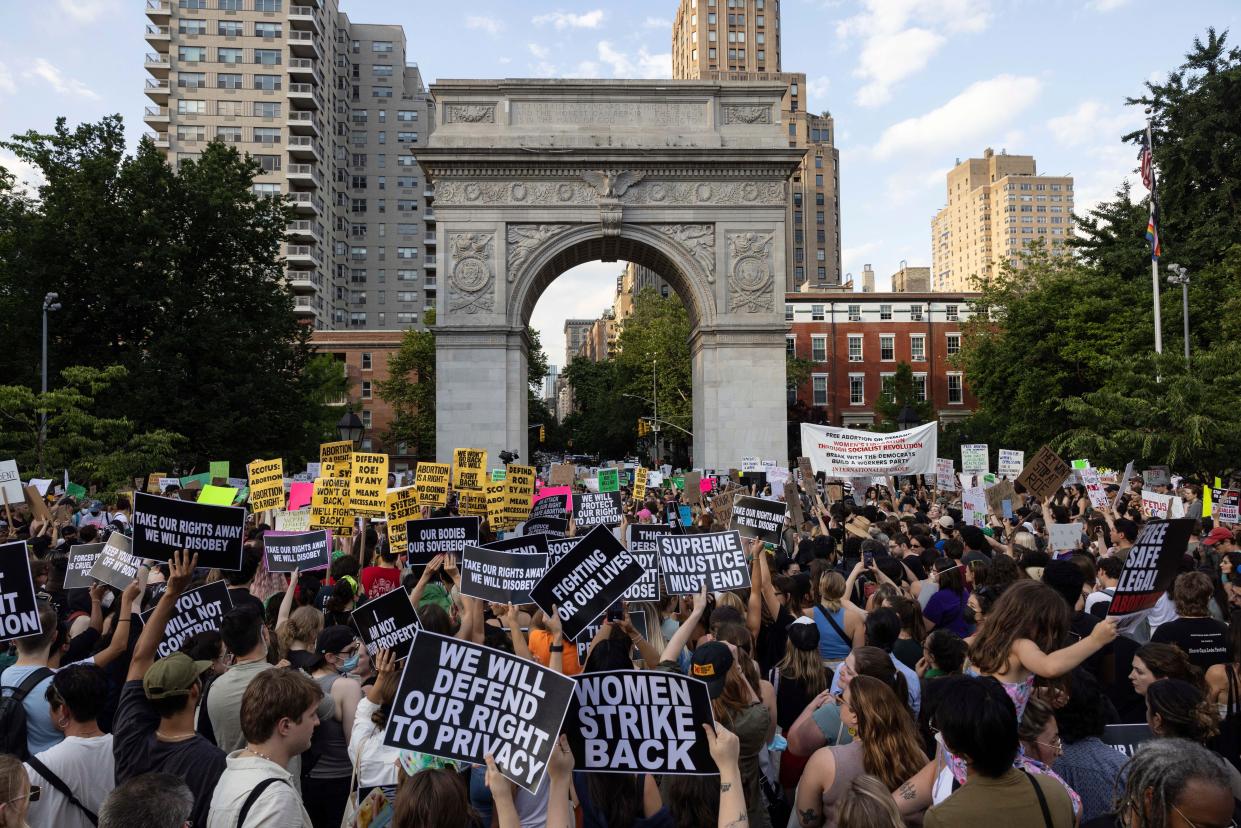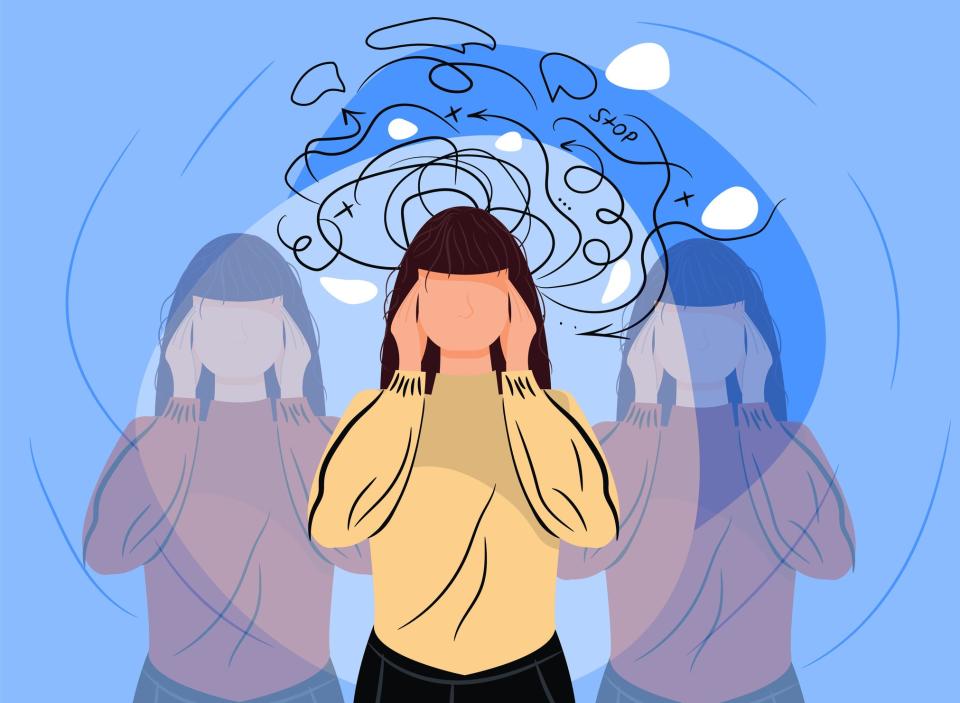How is your mental health after the Roe v. Wade overturn?

On June 25, I told you I was on my way to New York to celebrate Pride with friends. Little did I know the Supreme Court's decision to overturn Roe v. Wade would happen while I was there, prompting me to put on my metaphorical reporter cap and take to the streets to ask people how they were feeling.
The short answer? Not well.
I spoke to a range of people – different ages, races and genders – who attended a rally in Manhattan's Washington Square Park Friday evening. Here is some of what they said about the impact the news had on their mental health:
“I had a very hard time at work today,” said Jo Macellaro, 31. “Everybody there was really anxious and depressed and had trouble focusing.”
Selu Sky Lark, 26, called the court’s ruling “an attack,” one that suddenly may put into question their own quest for gender-affirming surgery.
“It’s definitely stressing me out,” they said. “It’s going to be a really hard couple of years. It’s going to be a fight every day.”
Channa Siegel, 39, confessed to throwing up earlier in the day, so troubling was the news of the court’s decision. Siegel, who has four daughters, said she once had an abortion in order to save her life.
“There are states now that would have let me die,” she says. Siegel’s emotions have at times overwhelmed her lately, which makes her concerned for her young daughters’ state of mind. Her own emotions are ranging from “pissed” to “appalled” to “mad.”
These quotes and more, including expert analysis, were part of a larger story my colleagues Naledi Ushe, Marco della Cava and I worked on together to explore the mental health impact of the SCOTUS decision.
To read the full piece, click here.
Are you too nice? Here's when that's a problem
You know what fight or flight is, but what about fawning? My colleague Jenna Ryu wrote about this lesser-known response and what it means.
People cope with and survive traumatic childhood experiences in different ways. Most people are familiar with fight, flight and freeze in order to achieve safety and escape a negative situation. But some, like Mikah Jones, engage in what trauma experts call "fawning," or attempt to please the threat in order to avoid conflict.
"Fawners or people-pleasers will be deeply attached to the idea of being overly nice because often the belief is is that by being nice, that will protect me against unpleasant situations with friends or family," says Katie McKenna, a psychotherapist and co-host of the "In Sight" podcast.
While this lesser-known trauma response seems harmless, experts warn that "being too nice" is actually a maladaptive coping mechanism with serious consequences.
Fawning involves "consistently abandoning your own wants and needs to serve others to avoid conflict, criticism or disapproval," McKenna says. It's also known as people-pleasing or co-dependence and includes over-apologizing, being hyper-aware of what others think and having an inability to set boundaries.
Trauma experts say fawning is most common in victims of relational abuse, referring to environments where parents, siblings, or loved ones are emotionally controlling, abusive or neglectful.
"When people think of trauma, they usually think of abuse – either physical abuse or sexual abuse. But there is another type of abuse," McKenna says. "If you were brought up by non-nurturing or abusive parents, you still need to form that attachment in order to feel safe. But in order to do this, you'd have to adjust to who your parents are."
To read Jenna's full story, click here.

I'm gay, but my mom wants me to marry a man. What can I do?
In this week's advice column, a reader wrote in: "I’m a 23-year-old female who came out as a lesbian over a year ago, and my mom keeps making offhand comments about my sexuality that bother me. She says she's supportive and that she's not homophobic, but then she keeps telling me to marry a man so I can have kids, then I can go 'be gay.' She's said it multiple times, and last week even told me that one of our family friends agrees with her. She’s made other comments saying she hates the word 'lesbian' and that I shouldn’t 'put myself in a box.'
You could say I'm a bit frustrated. My dad had no idea that she made these comments, but we agreed that I can't confront her because her mental health has been declining since my grandmother entered hospice. She also gets really defensive whenever she is confronted.
So I guess I just don't know how to cope with these feelings. I can't confront her, and I feel like I can't ignore it either. This is all very poor timing as I'm supposed to move into their house this July, so distance isn't an option either. Any advice is appreciated."
To see how our advice columnist responded, click here.
Today's reads
July 4 is this weekend! Here are 10 red, white and blue foods that will make your holiday party sparkle
Or, if you're not feeling so patriotic: Ambivalent about celebrating July 4? You’re not alone.
How long does alcohol stay in your system? That depends on several factors.
Are common multivitamins worth the money? New study explores the benefits, harms.
We didn’t have the empathy to talk about Elvis’ health problems then. What about now?
How long does food poisoning last? Here are the symptoms and how long to expect them to last.
Do these allergy ‘hacks’ actually work? We had experts weigh in.
Today's pet
Meet Leo.

"This is Leo napping on his blanket," writes Tammy Artman from Easton, Pennsylvania.
This article originally appeared on USA TODAY: Roe v. Wade overturn: How is your mental health?

